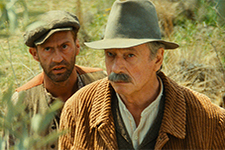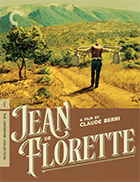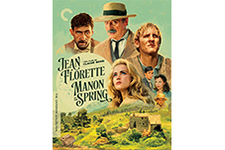Jean de Florette (4K UHD)
|  If you, like me, spent any appreciable amount of time in the 1980s and ’90s walking the aisles of mainstream video stores, then you know what the “Foreign Films” section was like. Usually just a couple of shelves, there was a faithful consistency to the titles from store to store, whether you were in a Blockbuster or a Hollywood Video. There was always a smattering of French New Wave movies, Italian neorealist classics, and at least a handful of Kurosawa films. István Szabó’s Mephisto (1981) was always guaranteed a spot, as was Giuseppe Tornatore’s Cinema Paradiso (1988) and Gabriel Axel’s Babbette’s Feast (1987). And, without doubt, no matter where you were, the shelves always included Claude Berri’s Jean de Florette and Manon of the Spring. I had seen these boxes on video store shelves so many times over the years that I could have sworn I had seen the films themselves despite never having watched them. Their titles—so French, so literary—and their box art (courtesy of U.S. distributor Orion Pictures) with portraits of the main stars, indelible French faces against a backdrop of the romantic countryside and bordered with ecstatic, four-star quotes gave an indelible sense of their prestigiousness as exemplars of the best that foreign cinema had to offer. Thus, when I finally watched Jean de Florette, I was pleasantly shocked and moved by what a tough film it is. Far from a whimsical and charming provincial melodrama, it is rather a merciless depiction of the fundamental cruelty of human greed and the immense devastation—emotional, financial, physical, and spiritual—it leaves in its wake. In stark contrast to its visual beauty, it effectively dramatizes the limits of a genuine work ethic when it is caught in the unfair confines of deception and betrayal. We like to tell ourselves that if we work hard enough and do the right thing, we will be rewarded, but that is not always the case. The Protestant work ethic requires a playing field that is at least somewhat level, and that is not what happens in Jean de Florette. Set in rural Provence in the 1920s, the film begins with the reuniting of Cesar Soubeyran (Yves Montand), an aging farmer who is the last of his dynastic family that has dominated the region for generations, and his nephew Ugolin (Daniel Auteuil), who returns from service in World War I with dreams of growing carnations on the family land. However, to make his dream come true, he needs more space and, more importantly, a water source, which the neighboring farm has in abundance via a hidden spring. When the owner of the land dies, Cesar and Ugolin plan to buy it on the cheap, assuming that the family is not interested. Their plans are thwarted with the arrival of the titular character, Jean (Gérard Depardieu), who moves from the city with his wife, Aimee (Elisabeth Depardieu) and young daughter Manon (Ernestine Mazurowna). Jean has inherited the farm and harbors dreams of turning it into a rural paradise for his family where he plans to grow vegetables and raise rabbits. A well-read autodidact who has no practical experience working the land, Jean is not taken seriously by the locals, who are suspicious of him because he is from the city and because he is a hunchback. Gregarious, ambitious, and genial, Jean is determined to make his family dreams come true. However, what he doesn’t know is that Cesar and Ugolin have secretly blocked the spring on his land and kept it hidden from him, which puts him at a major disadvantage in farming and raising rabbits because he is wholly reliant on rainfall, which is highly unreliable. While Cesar keeps his distance from Jean, Ugolin ingratiates himself into the family, first to glean information about how there are doing (hoping that Jean will fail in his endeavors and sell the land cheap) and later because he comes to genuinely like Jean and care about his goals, which puts him at a moral and ethical crossroads. As the story progresses, Jean becomes more and more desperate in his plight. Once the summer drought sets in and his carefully laid plans begin to literally burn up before his eyes, he and his family begin trekking miles by foot to retrieve water from a spring at the far end of their land. Because we know that there is a spring right there by their house, their brutal journeys back and forth are all the more painful to watch, and Cesar and Ugolin seem all the more monstrous. What was once joy and exhilaration in Jean’s work is slowly ground down by the realities of suffering and failure, to the point that he becomes obsessive and demented in his quest for success. Already burdened by his deformed body and his rejection by the locals, Jean’s plight is utterly tragic in its trajectory from hopeful ambition to abject failure, all of which could have been prevented had Cesar and Ugolin set aside their own desires and been honest. Jean de Florette was adapted by director Claude Berri and co-writer Gérard Brach from the 1963 two-volume novel The Water of the Hills (L’Eau des collines) by Marcel Pagnol, which Pagnol adapted from his 1952 film Manon of the Spring (Manon des sources). It was shot simultaneously with a second film, Manon of the Spring, which was released six months later. It was an immensely anticipated project, as Pagnol was a French literary, theatrical, and cinematic luminary who had passed away a decade earlier. Although Berri had won an Oscar for Best Live Action Short Film in 1963 with Le poulet, his subsequent career was somewhat uneven, ranging from extremely good films like his unsentimental feature debut The Two of Us (1967), to a series of semi-successful bittersweet comedies in the 1970s. Jean de Florette and Manon of the Spring became his greatest international successes, earning widespread critical acclaim and commercial success in both France and abroad (Jean de Florette won seven BAFTA awards in England, including Best Picture, and while it was nominated for six César awards in France, it was only awarded one for Best Actor for Daniel Auteuil; in the U.S. it was named Best Foreign Film by the National Board of Review and the New York Film Critics Circle, although it was not nominated for an Oscar). The film is beautifully shot by cinematographer Bruno Nuytten, who turns the Provencal landscape into a place of both respite and punishment. The same hills and trees that seem so inviting at the beginning of the film later speak to Jean’s desperation and failure. The script is refined and pointed, moving the story along at a pace that is both efficient and reflective, allowing plenty of room for the characters and their intersecting arcs, all of whom are brilliantly embodied. Yves Montand makes Cesar into a portrait of steely determination and ruthlessness without ever quite losing his humanity (beneath that taciturn exterior we sense desperation and a sense of loss), while Daniel Auteuil makes Ugolin into a sympathetic, semi-pathetic accomplice who is too simple-minded to resist his uncle’s plotting despite his clear understanding of its cruelty. And then there is Gérard Depardieu, whose character moves from the joyful to the decimated, thus charting in all-too-human terms the immense price that the innocent often pay for the greed of others without even knowing it.
Copyright © 2025 James Kendrick Thoughts? E-mail James Kendrick All images copyright © The Criterion Collection | |||||||||||||||||||||||||||||
Overall Rating: 


 (3.5)
(3.5)


 This four-disc set includes 4K UHD and Blu-ray discs of Jean de Florette (1986) and Manon of the Spring (1986).
This four-disc set includes 4K UHD and Blu-ray discs of Jean de Florette (1986) and Manon of the Spring (1986).